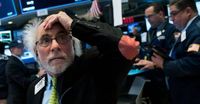On April 7, 2025, American Depositary Receipts (ADRs) for major Brazilian companies Vale and Petrobras experienced significant declines in pre-market trading in New York. The downturn was largely attributed to fears of a global recession, exacerbated by the ongoing trade war initiated by U.S. President Donald Trump.
As of 8:52 AM, Vale's ADRs (VALE3) fell by 2.42%, trading at $8.86, while Petrobras (PETR4) saw a sharper decline of 3.43%, priced at $12.68. The situation reflects broader concerns about the stability of the global economy, particularly in light of new tariffs imposed by Trump on imports.
In the futures market, the most traded iron ore contract on the Dalian Commodity Exchange for September 2025 closed down 3.29%, priced at 720 yuan per ton (approximately $98.86). The second most traded contract for May 2025 ended down 3.3%, at 762.5 yuan, or about $104.70 per ton. These declines are indicative of a broader trend affecting commodities, as fears of a recession loom large.
Trump's comments over the weekend did little to calm the markets. He stated, “I didn’t break the market on purpose… I don’t want anything to fall… but sometimes, you have to take medicine to fix something,” while aboard Air Force One on April 6. His remarks came amid escalating tensions with China, which retaliated against the U.S. tariffs, further unsettling investors.
The price of Brent crude oil also fell by 2.42% to $63.99 per barrel during the same timeframe. This drop is primarily attributed to an unexpected decision by the Organization of the Petroleum Exporting Countries (OPEC) to increase supply by a volume three times greater than anticipated for the upcoming month. The combination of these factors has led to a widespread decline across global stock markets.
By 8:50 AM Brasília time, Petrobras’ ordinary shares’ ADRs had decreased by 3.96%, trading at $12.61, while the preferred shares (PBRa) fell by 3.62%, priced at $11.44. Vale's ADRs (VALE) similarly dropped by 2.64%, settling at $8.84. The declines reflect a pessimistic outlook for the oil and iron ore markets, both of which have been under pressure from the ongoing trade tensions.
As investors reacted to the grim outlook, the iShares MSCI Brazil ETF, which mirrors the performance of major Brazilian stocks traded on Wall Street, plummeted 3.31% in pre-opening trades, with shares trading at $23.69. The negative performance of these key stocks is expected to weigh heavily on Brazil's Ibovespa index, which has been sensitive to the performance of major players like Vale and Petrobras.
In the broader context, global stock markets are facing severe downturns. The Tokyo Stock Exchange reported a staggering loss of 7.83%, while Hong Kong's Hang Seng Index fell by 13.22%, marking its most significant drop since the Asian financial crisis in 1997. Shanghai's market also suffered, with a decline of 7.34%, the largest single-day drop since February 2020.
In Europe, the Stoxx 600 index fell nearly 5%, while individual exchanges in Frankfurt, Paris, and London reported losses of 4.61%, 4.85%, and 4.49%, respectively. In the U.S., Dow Jones futures dropped by 4.08%, and S&P 500 futures fell by 4.48% as investors reacted to the unfolding crisis.
The market's volatility extends beyond traditional stocks. Cryptocurrencies are also feeling the pinch, with Bitcoin experiencing a decline of 7.95% in the last 24 hours, trading at $75,888.91. Ethereum saw an even steeper drop of 15.65%, falling below the critical support level of $1,500.
As investors seek refuge from the chaotic market environment, gold prices have surged above $3,000 per troy ounce, a clear indication of the flight to safety that typically occurs during periods of economic uncertainty.
Overall, the financial landscape is fraught with challenges as the ramifications of Trump's tariff policies continue to ripple through global markets. The significant declines in the ADRs of Vale and Petrobras serve as a microcosm of the broader economic anxieties that are currently gripping investors worldwide.
In summary, the market turmoil on April 7 reflects a convergence of factors, including Trump's trade policies, commodity price fluctuations, and fears of a global recession. As the situation evolves, investors will be closely monitoring developments in both the U.S. and China, as any further escalation could have profound implications for the global economy.





